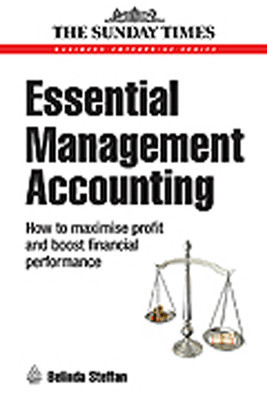Essential Management Accounting: How to maximise profit and boost financial performance 01 Edition(English, Paperback, Belinda Steffan)
Quick Overview
Product Price Comparison
Essential Management Accounting is an accessible, practical guide that will demystify management accounting techniques. It takes you through the rules of basic accountancy and shows you how you can build them into other areas of your business. Divided into three main sections - business planning and analysis; business management and operations; and corporate finance - it is invaluable for entrepreneurs and anyone in business. It covers: Working capital management Marketing Planning and budgeting Decision making Creating a Management Accounting Pack (MAP) Organizational management Project management Information strategy Contract law Corporate finance for small businesses Methods of exit. Key issues are highlighted by the use of fascinating real-life case studies, showing you how to maximize the potential of your business and make crucial decisions about its future performance. About The Author Belinda Steffan is a Chartered Management Accountant with 12 years? experience in the SME market at all levels of management, including finance director. She has set up, grown, operated and exited from companies in industries including telecommunications, advertising/media, retail and tourism. Table of Contents PART I: BUSINESS PLANNING AND ANALYSIS Business planning: Why use a business plan? The relevance of management accounting to effective business planning What makes a good business plan? Writing the business plan Structure of a typical business plan How to get started writing your business plan Timescale of the business plan Review the final document What to do with your completed business plan Is there an alternative to a business plan? Conclusion Key points to remember Working capital management: The relevance of management accounting to working capital management Cash is king Profits do not equal cash Cashflow forecasts Methods of cashflow management The cash operating cycle Ratio analysis Conclusion Key points to remember Marketing: The relevance of management accounting to marketing Specific marketing techniques Conclusion Key points to remember Planning and budgeting: Why budget? The relevance of management accounting to budgeting Set company objectives Strategic and planning review Different types of budget Building the budget Other budget information to consider The planning horizon Is there an alternative to formal business planning? Conclusion Key points to remember Decision making: Management accounting terminology Management accounting techniques Conclusion Key points to remember PART II: BUSINESS MANAGEMENT AND OPERATIONS Management accounting pack (MAP): Who will be using this report? How often will the report be produced? What are the needs of the parties who will review the map? What factors are important to the business? Contents of a MAP Chart of accounts Conclusion Key points to remember Organisational management: Relevance of management accounting to organisational management Labour productivity analysis Organisational structure Importance of the finance function Organisational behaviour - problem solving Factors that impact on job satisfaction Importance of organisational management policies Conclusion Key points to remember Project management: The relevance of management accounting to project management When should an initiative be treated as a project? Project management constraints Project management models Choosing the project manager IT solutions Is there an alternative to project management? Conclusion Key points to remember Information systems: Data and information Business areas for information flow The relevance of management accounting to information systems Information systems strategy Transaction processing system (TPS) Data sources Data capture Knowledge management Using information systems competitively Characteristics of good information Social change and ethics Conclusion Key points to remember Contract law: The relevance of management accounting to contract law Contract law - basic principles Format - does a contract have to be in writing? Components of a contract Contract law and the SME Conclusion Key points to remember PART III: CORPORATE FINANCE Corporate finance for small businesses: What is corporate finance? Sources of finance Equity vs loan capital Sources of capital available to small businesses Capital structure Mergers and acquisitions Shareholder strategy Risk and return Advisers - when you need them and what to expect Conclusion Key points to remember Exit: Why would you want to exit? Methods of exit Exit options Company valuation Other factors to consider on exit Conclusion Key points to remember Glossary Further reading Index


